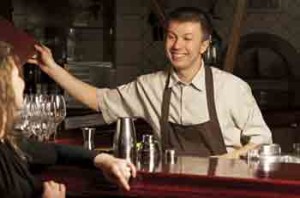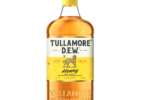32% of UK consumers intend going out “as much as possible”

“Ireland will have our evidence from the 17th of May onwards about what’s happening” said Kate Nicholls, “about what are the mitigation measures that work the most…”
The CGA survey of consumer confidence there was commissioned by UKHospitality, whose Chief Executive, Kate Nicholls OBE, gave the Keynote Address at the ‘Reopening in Covid-19 World: The Evolution of Health & Safety’ session at the recent Restaurant Association of Ireland’s virtual Hospitality & Tourism Expo.
UKHospitality’s members are involved in all aspects of hospitality in the UK from coffee shops to cafes, restaurants, bars, pubs and hotels, visitor attractions and accommodation.
Kate gave those virtually attending the session an overview of what UKHospitality had been doing primarily in England which reopened recently.
She pointed out that key risks in operating in the hospitality sector had been identified and mitigated through adopting rigorous protocols. This meant that hospitality now had a more rigid hygiene regime on reopening than that in schools or even hospitals.
Only one-third of venues have initially reopened for outdoor service in England, or around 22% of potential trading areas.
“It’s a very small proportion” she agreed, “but the soft opening allowed us to bring more people back and train them.”
The sector hopes that indoor service can resume from the 17th of May and that the 21st of June will see the removal of all legal restrictions on social contact and Social Distancing.
“As a result Ireland will have our evidence from the 17th of May onwards about what’s happening” she said, “about what are the mitigation measures that work the most…”
At the start of the year, when the UK went into its fourth Lockdown, UKHospitality said that it needed a clear roadmap and presented the government there with a three-point plan.
This involved it having indicative dates for reopening linked to the vaccine roll-out and with the certainty that the roll-out was going to be irreversible. The plan had been designed to rebuild business confidence in the sector.

UKHospitality also wanted to look at the recovery programme and business supports.
Latest data on UK business & customer confidence
UKHospitality’s plea to government to give it a degree of certainty was to rebuild confidence, to get investment back into the sector and unlock some of those ‘difficult discussions’ around rent and loans that were causing a problem.
The organisation had conducted consumer research via CGA’s sentiment trackers to gauge consumer confidence in reopening.
Given the pent-up demand for out-of-home eating and drinking-out experiences, 51% of GB customers predicted that they’d return to a venue within the first few weeks of it reopening.
“This was a much more positive response than after the first Lockdown where we only had a third of customers keen to come out. It took us a good 10 weeks before we got to two-thirds of customers responding,” she said.
Now, confidence in visiting pubs and late night venues is catching up with other venues.
Thanks to the time and investment in promoting how Covid-safe hospitality venues have now become, the sector hasn’t had to do as much “heavy lifting” this time around about being a Covid-secure venue.
“It’s much more about the experience the people are looking for,” said Kate, “The message of safety seems to have been reinforced during a protracted closure period.”
1 in 3 intend “to go out as much as possible”
Nearly one in three (32%) UK consumers intend to “go out as much as possible” once restrictions are lifted, with 11% strongly agreeing with that sentiment.
87% of those who plan to go out as much as possible, also plan to treat themselves when they do go out again.
“So this is all about the experience. Much more of the kind of marketing material that we need to put out to our customers is about coming back and having a good time – much more than it was in July last year when we reopened.
“We’ve got a lot of business support from government – an extension of business rates relief of 100% for Wales, Scotland and NI for the full year. But in England it’s just three months of a 100% rates holiday but it’s a 67% reduction in business rates for the remainder of the year. Crucially, we retain our lower rate of VAT.
“Those measures have fed through to an increase in business confidence.”
The key to successfully reopening there is about the level of restrictions with which the sector will be reopening.
“There’s also a lot of uncertainty in our restaurants and pubs about rent – there’s a huge overhang of rent debt that people are really concerned about and uncertain about – and it’s not certain that they’ll be out of the woods, back to pre-pandemic, for another 12-18 months.”
Hospitality & the Economy

UKHospitality members are now much more positive about the future of the hospitality sector, with over half feeling optimistic about the next 12 months (54%) compared to 12% of members last November.
Kate Nicholls also went on to explain why politicians there should prioritise opening up hospitality and getting the sector free of restrictions as quickly as possible, where they see hospitality as particularly valuable.
For example, in answer to a CGA Business Leaders Survey 2021 question ‘As we emerge from the pandemic where do you think the hospitality sector can make the greatest contribution to the UK economy and society?’, 81% believe that the sector can boost the national economy; 65% believe that it can offer job-creation, skills & employment opportunities and 53% believe that the sector can help bring the community together. The political audiences have therefore seen the benefits of hospitality to the economy, she said.
UKHospitality members are now much more positive about the future of the hospitality sector, with over half feeling optimistic about the next 12 months (54%) compared to 12% of members last November.
Early in the New Year also had a “real downbeat feel to sentiment” too, she remembered.
Nevertheless, 28% remained pessimistic.
Kate believes it likely that one-third of businesses there will not be able to reopen again at all.
“The sector has lost 12,000 businesses over the last year, almost one in five of our restaurants.
“There’s been a 10% contraction in the accommodation businesses and a contraction of 7% in pubs and bars.”
Nevertheless, hospitality is generating one in six of net new jobs and the hospitality sector itself is growing 5% year-on-year.
Covid Certification debate
The industry also awaits the outcome of debates about Covid Certification and whether or not this will be required for entry to hospitality venues.
Covid Status Certification for use in pubs and restaurants is likely to be based around an online app – probably through the NHS app – that would allow people to identify that they’d either been vaccinated (one dose or two) or that they’d had an antigen test to prove that they’d had the disease on a positive diagnosis or natural flow testing.
Unlike the climate in the UK and Ireland, for example, Israel’s climate allows 80% of hospitality to be conducted outdoors and Certification is only used as a tool to allow people access to a premises when going indoors, she explained.
“Testing is a live debate in the UK at the moment and we’re hopeful that one wouldn’t need a Passport to get a pint” she said.
However this is likely to be introduced for the bigger mass events in hospitality.
Various reviews on the subject of Certification requirement are expected to conclude in mid- to late-May.
Overall, the sector can now see a route through to recovery but this will require the right fiscal and regulatory environment, she said, adding, “The road to recovery is going to be long and the route to rebuilding is to see business rate holidays being extended and VAT being extended.”

“Testing is a live debate in the UK at the moment and we’re hopeful that one wouldn’t need a Passport to get a pint” said Kate Nicholls.








